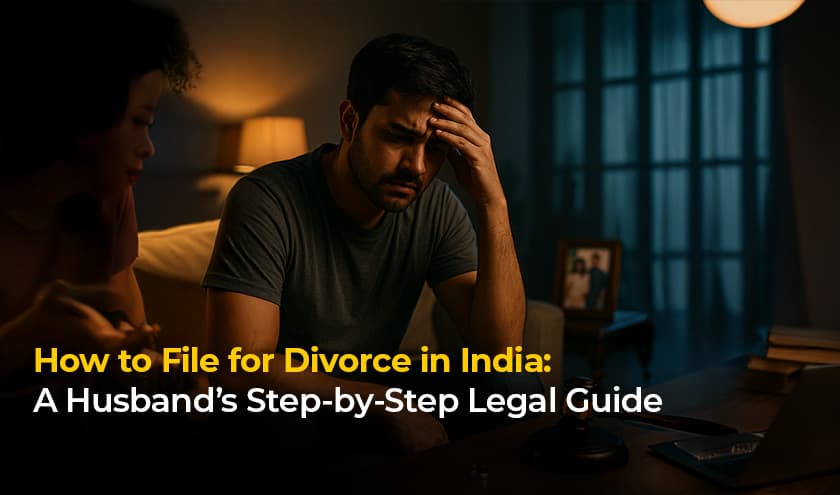How to File for Divorce in India: A Husband’s Step-by-Step Legal Guide

Divorce is never easy, and for many husbands in India, the process can feel overwhelming and confusing. Did you know that following the correct legal procedure can significantly reduce delays and legal complications? If you are considering filing for divorce, understanding the divorce process for the husband from start to finish can save time, reduce stress, and protect your rights. This guide provides a comprehensive roadmap for initiating a divorce, including actionable steps and professional guidance from Divorce Lawyers in India.
Why Understanding the Divorce Process Matters
Filing for divorce in India is a serious legal decision that involves careful planning, documentation, and awareness of your rights. Many husbands are unsure where to begin or how to navigate the legal complexities, which can lead to delays and disputes. This step-by-step guide explains how a husband can legally file for divorce, including the legal procedure, required documentation, and common challenges. By following these practical steps and seeking expert legal advice, you can ensure a smoother, more efficient divorce process.
Understanding Divorce Laws in India for Husbands
Legal Framework for Divorce in India
Divorce laws in India are primarily governed by religion-based personal laws:
- Hindu Marriage Act, 1955 – applies to Hindus, Buddhists, Jains, and Sikhs.
- Special Marriage Act, 1954 – applies to interfaith or civil marriages.
- Muslim Personal Law (Shariat) – applies to Muslims.
- Christian Marriage Act, 1872 and Parsi Marriage Act, 1936 – for respective communities.
Husbands can file for divorce under grounds such as adultery, cruelty, desertion, mutual consent, mental disorder, or conversion, depending on the applicable law.
Recent Legal Updates and Trends
Courts encourage mediation and reconciliation before proceeding to litigation. Mutual consent divorces are increasingly favored, making knowledge of the legal framework and procedure essential for a faster resolution.
Common Issues and Misconceptions About Divorce for Husbands
Misconception 1: Divorce Process Is the Same for Everyone
The procedure varies based on religion and type of marriage. For instance, the waiting period for mutual consent divorce under Hindu law is six months, but it differs under other personal laws.
Misconception 2: Fathers Lose Custody Automatically
Child custody decisions are based on the best interests of the child, not marital status. Fathers can retain custody, especially for older children or in shared custody arrangements.
Misconception 3: Self-Filing Is Sufficient
While self-filing is possible, consulting a Divorce Lawyer in India ensures proper documentation, accurate petitions, and timely submission, minimizing legal risks.
How a Husband Can File for Divorce
Step 1: Determine Eligibility and Grounds for Divorce
- Identify the appropriate grounds for divorce under your applicable law.
- Consider mutual consent divorce if both parties agree to simplify the process.
Step 2: Consult a Divorce Lawyer
- Seek advice from an experienced Divorce Lawyer in Delhior your city.
- Discuss legal strategy, potential challenges, and documentation requirements.
Step 3: Draft and File the Divorce Petition
- Prepare a divorce petition including marriage details, grounds, and relief sought.
- Attach supporting documents such as marriage certificate, identity proofs, and evidence supporting your claims.
Step 4: Court Proceedings
- File the petition in the Family Court or District Court with jurisdiction.
- Attend hearings and possible reconciliation sessions.
- Respond to counter-petitions if filed by your spouse.
Step 5: Interim Orders and Settlements
- Courts may grant temporary alimony, custody, or residence orders.
- Attempt settlement agreements to reduce litigation time.
Step 6: Obtain Final Divorce Decree
- After mandatory waiting periods and hearings, the court issues a divorce decree.
- Obtain certified copies for legal and financial matters.
Case Studies: Real-Life Examples (Anonymized)
Case Study 1: A husband filed for mutual consent divorce in Delhi and completed the process in six months with legal guidance and proper documentation.
Case Study 2: A husband filed under cruelty; delays occurred due to incomplete evidence and missed deadlines, highlighting the importance of professional legal support.
These examples emphasize how early lawyer consultation can streamline the process and prevent complications.
Best Practices for Husbands Filing for Divorce
- Consult a Divorce Lawyer early to clarify rights and obligations.
- Maintain clear documentation supporting your grounds for divorce.
- Communicate effectively with your spouse if pursuing mutual consent.
- Understand financial, property, and child custody implications beforehand.
- Follow court deadlines strictly to avoid unnecessary delays.
Husband’s Step-by-Step Divorce Support with VakeelSaab
Filing for divorce is legally complex and emotionally challenging, but you don’t have to navigate it alone. At VakeelSaab, our team of experienced Divorce Lawyers in India guides husbands through every step of the process. From filing petitions to securing fair settlements and custody arrangements, we provide personalized, expert support. Book a consultation today to protect your rights and ensure a smooth divorce process.
Frequently Asked Questions (FAQ)
- Can a husband file for divorce without a lawyer?Yes, but professional guidance ensures faster resolution and fewer errors.
- How long does divorce take in India?Mutual consent divorces can take 6–12 months; contested divorces may take several years.
- What documents are required to file divorce?Marriage certificate, ID proofs, address proofs, evidence supporting grounds, and court fees.
- Is alimony mandatory for husbands?Alimony is decided case-by-case, based on income, needs, and grounds for divorce.
- Can divorce proceed if the spouse refuses to cooperate?Yes, a contested divorce allows you to proceed legally even without consent.
Related Articles
The Importance of Consulting a Property Lawyer for Real Estate Issues
Blog
How to File a POCSO Complaint in India: Step-by-Step Legal Process
Blog
What punishments does the law give for giving, taking, or asking for dowry?
Blog
Reasons for the Increasing Divorce Rates in India
Blog
What is a Special Leave Petition? Meaning, Features, Process & & Who Can File?
Blog
What Is the Difference Between Mutual Divorce and Contested Divorce?
Blog